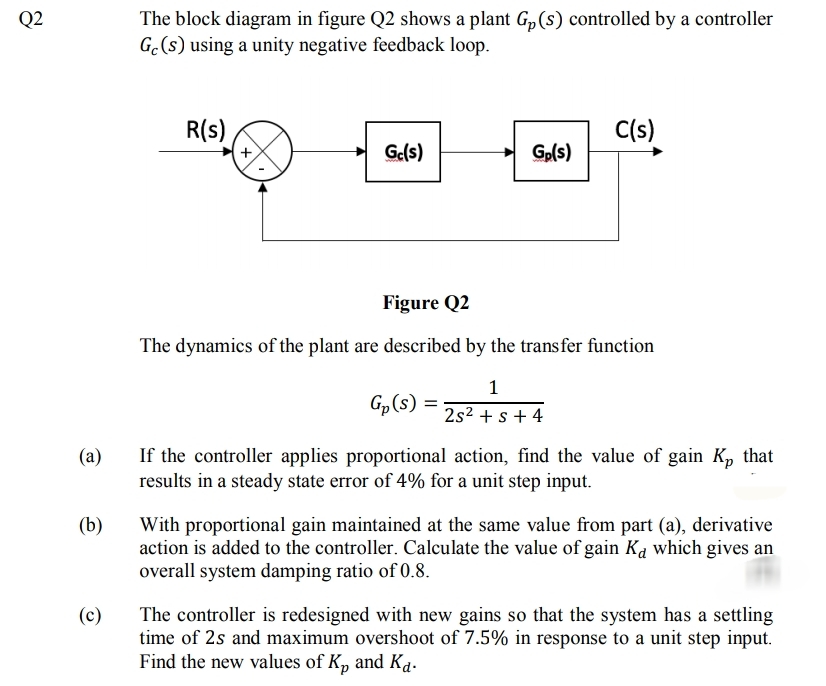The block diagram in figure Q2 shows a plant G, (s) controlled by a controller Gc(s) using a unity negative feedback loop. R(s) C(s) + Ge(s) Gp(s) Figure Q2 The dynamics of the plant are described by the trans fer function 1 Gp(s) = 2s2 + s + 4 If the controller applies proportional action, find the value of gain Kp that results in a steady state error of 4% for a unit step input. With proportional gain maintained at the same value from part (a), derivative action is added to the controller Calculate the value of gain K. which gives ar
The block diagram in figure Q2 shows a plant G, (s) controlled by a controller Gc(s) using a unity negative feedback loop. R(s) C(s) + Ge(s) Gp(s) Figure Q2 The dynamics of the plant are described by the trans fer function 1 Gp(s) = 2s2 + s + 4 If the controller applies proportional action, find the value of gain Kp that results in a steady state error of 4% for a unit step input. With proportional gain maintained at the same value from part (a), derivative action is added to the controller Calculate the value of gain K. which gives ar
Introductory Circuit Analysis (13th Edition)
13th Edition
ISBN:9780133923605
Author:Robert L. Boylestad
Publisher:Robert L. Boylestad
Chapter1: Introduction
Section: Chapter Questions
Problem 1P: Visit your local library (at school or home) and describe the extent to which it provides literature...
Related questions
Question

Transcribed Image Text:Q2
The block diagram in figure Q2 shows a plant G„(s) controlled by a controller
G.(s) using a unity negative feedback loop.
R(s),
C(s)
Ge(s)
Gp(s)
Figure Q2
The dynamics of the plant are described by the trans fer function
1
Gp(s) =
2s2 + s + 4
If the controller applies proportional action, find the value of gain K, that
results in a steady state error of 4% for a unit step input.
(a)
(b)
With proportional gain maintained at the same value from part (a), derivative
action is added to the controller. Calculate the value of gain Ka which gives an
overall system damping ratio of 0.8.
(c)
The controller is redesigned with new gains so that the system has a settling
time of 2s and maximum overshoot of 7.5% in response to a unit step input.
Find the new values of K, and Ka.
Expert Solution
This question has been solved!
Explore an expertly crafted, step-by-step solution for a thorough understanding of key concepts.
Step by step
Solved in 4 steps with 4 images

Knowledge Booster
Learn more about
Need a deep-dive on the concept behind this application? Look no further. Learn more about this topic, electrical-engineering and related others by exploring similar questions and additional content below.Recommended textbooks for you

Introductory Circuit Analysis (13th Edition)
Electrical Engineering
ISBN:
9780133923605
Author:
Robert L. Boylestad
Publisher:
PEARSON

Delmar's Standard Textbook Of Electricity
Electrical Engineering
ISBN:
9781337900348
Author:
Stephen L. Herman
Publisher:
Cengage Learning

Programmable Logic Controllers
Electrical Engineering
ISBN:
9780073373843
Author:
Frank D. Petruzella
Publisher:
McGraw-Hill Education

Introductory Circuit Analysis (13th Edition)
Electrical Engineering
ISBN:
9780133923605
Author:
Robert L. Boylestad
Publisher:
PEARSON

Delmar's Standard Textbook Of Electricity
Electrical Engineering
ISBN:
9781337900348
Author:
Stephen L. Herman
Publisher:
Cengage Learning

Programmable Logic Controllers
Electrical Engineering
ISBN:
9780073373843
Author:
Frank D. Petruzella
Publisher:
McGraw-Hill Education

Fundamentals of Electric Circuits
Electrical Engineering
ISBN:
9780078028229
Author:
Charles K Alexander, Matthew Sadiku
Publisher:
McGraw-Hill Education

Electric Circuits. (11th Edition)
Electrical Engineering
ISBN:
9780134746968
Author:
James W. Nilsson, Susan Riedel
Publisher:
PEARSON

Engineering Electromagnetics
Electrical Engineering
ISBN:
9780078028151
Author:
Hayt, William H. (william Hart), Jr, BUCK, John A.
Publisher:
Mcgraw-hill Education,